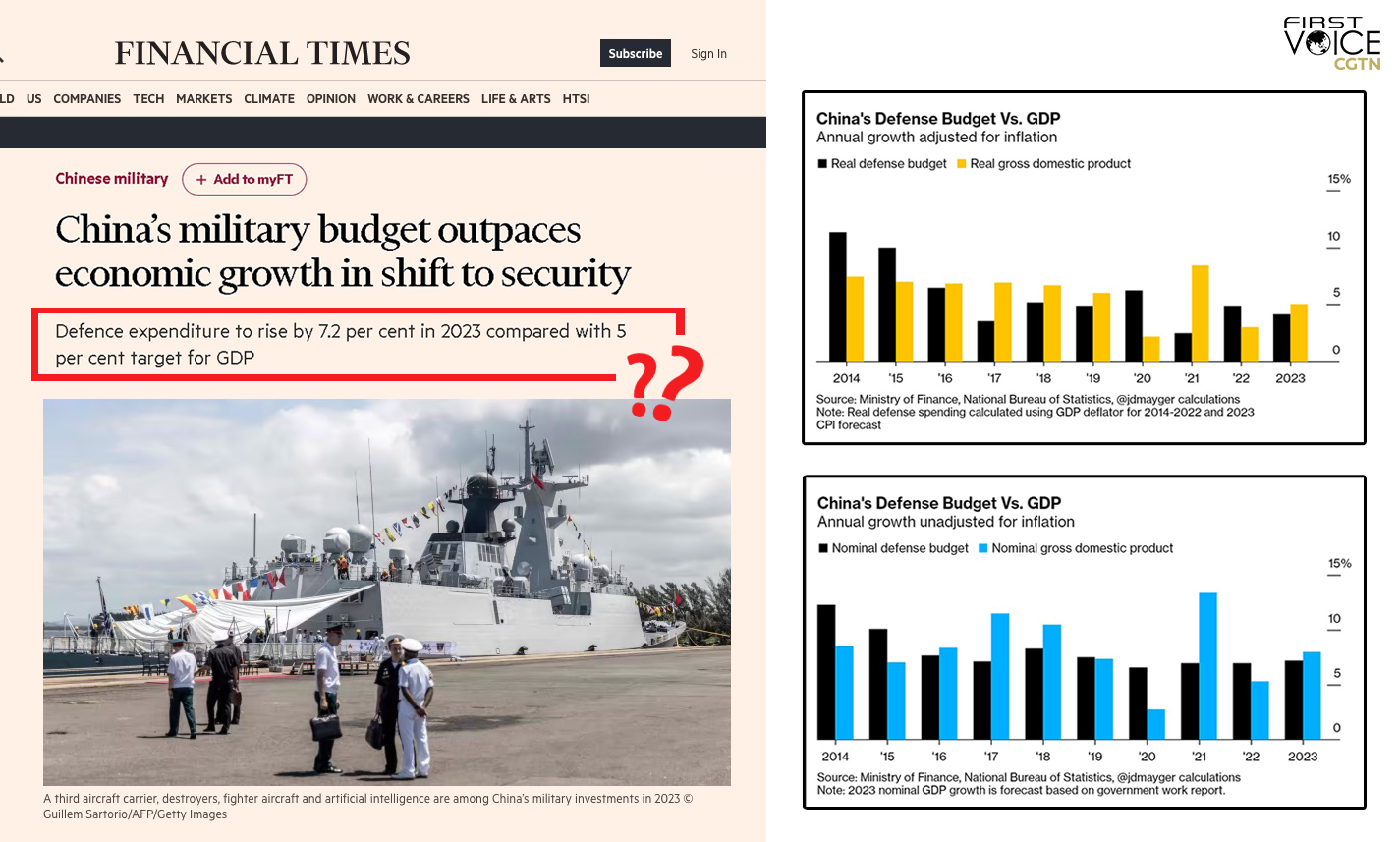
Military medical staff airlifted by eight large transport planes of the air force of the People's Liberation Army (PLA) arrive at Tianhe International Airport, to support coronavirus fight in Wuhan, central China's Hubei Province, February 2, 2020. /Xinhua
Military medical staff airlifted by eight large transport planes of the air force of the People's Liberation Army (PLA) arrive at Tianhe International Airport, to support coronavirus fight in Wuhan, central China's Hubei Province, February 2, 2020. /Xinhua
Editor's note: CGTN's First Voice provides instant commentary on breaking stories. The column clarifies emerging issues and better defines the news agenda, offering a Chinese perspective on the latest global events.
China on Sunday announced a 7.2-percent hike in its annual defense budget for 2023. It's for the eighth year in a row that the world's second largest economy will remain at single-digit growth in military budget.
The increase is necessary for defense building and stands in accordance with the economic development level of the country. Nevertheless, some Western countries have shown deep concerns over Beijing's "strategic" intentions behind the increase, especially as tensions have escalated last year over the Taiwan Strait.
Certain Western media outlets, for instance, Financial Times, say China's defense spending "outpaces" its economic growth. The comparison doesn't hold water. It is comparing nominal growth in military budget and the real growth in economy.
"When talking about government spending on defense or anything else, we should try and compare apples with apples," Bloomberg reporter James Mayger Tweeted. He cited official figures and concluded that two views – adjusted for inflation or unadjusted – of the change in Chinese defense spending show the military budget has grown slower than the economy.

The 7.2-percent hike is moderate, and China's military modernization is not a threat to any country, Li Jie, a Beijing-based military expert, told CGTN. Amid the deteriorating security environment last year, a slew of countries are going on military spending sprees this year. The U.S. accounts for the lion's share with $858 billion. That's about four times that of China.
Japan earlier unveiled its $49.88 billion defense budget for 2023 – a record-breaking increase of 26.3 percent. Germany rose by 17 percent and India by 13 percent. Taking these figures into account, China's 7.2 percent – which is only a 0.1 percentage point higher compared with last year – is not that high, Li said.
China's defense spending as a share of the nation's GDP has stayed below 1.5 percent for many years. The figure is lower than the world average of 2 percent. In contrast, the U.S. spends nearly 4 percent of its GDP on defense and has required its NATO allies to increase the figure to above 2 percent. India's military budget stood at 2.2 percent of its GDP last year, and Japan pledged earlier to raise the figure to 2 percent within five years.
Against the backdrop of the Russia-Ukraine conflict, the world is witnessing a deteriorating security situation in recent years. But China has exerted restraints on its military budget. Its defense expenditure, if expressed in U.S. dollars, is $225 billion for this year – less than last year's $229 billion. China will not participate in an arms race with other countries.
China's military spending is based on its economic development. The country – reporting 3 percent GDP growth for 2022 – has set its GDP target of around 5 percent for 2023. This has provided a basis for the hike in the country's military budget.
China pursues a national defense policy that is defensive in nature. The increased defense budget is part of the country's efforts to safeguard territorial integrity and modernize its armed forces. As neighboring countries including Japan and India are boosting their military budgets at a higher rate, China's 7.2 percent hike is necessary to defend its sovereignty, said Li.
China intends to realize the modernization of national defense and armed forces by 2035, and build its armed forces into world-class forces by the mid-21st century. In addition, the country is placing more focus on technology and military equipment, which require increases in military spending.
The 7.2 percent hike will support the Chinese military in tackling non-conventional security threats. Chinese troops have played a vital role in emergency rescue and disaster relief in the past few years. Meanwhile, as a major contributor to the UN peacekeeping budget, China has dispatched over 50,000 personnel on peacekeeping missions over the past 30 years.
The boost in China's defense budget, as analysts believe, is "reasonable and restrained." Unlike certain Western countries that have been raising military expenditure for hegemony, China will never seek expansion or sphere of influence. China is not a threat to any country, but stands ready to resist any challenges against it.
(If you want to contribute and have specific expertise, please contact us at opinions@cgtn.com. Follow @thouse_opinions on Twitter to discover the latest commentaries in the CGTN Opinion Section.)